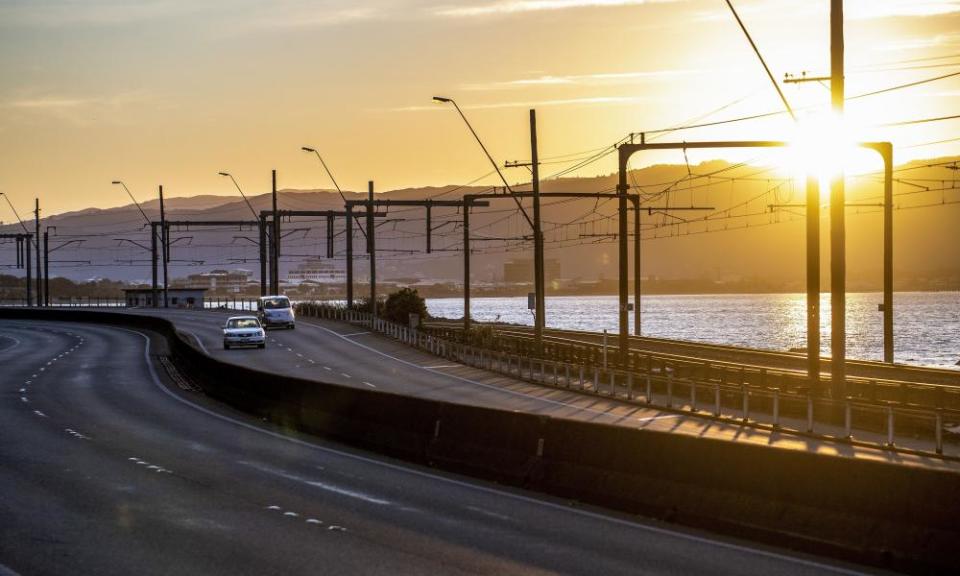Bored and anxious New Zealanders turn to exercise shaming as lockdown grinds on

New Zealanders are usually pragmatic people who don’t put much stock in strict adherence to rules. But almost a fortnight into restrictive nationwide lockdown measures intended to halt the spread of Covid-19, a bored and anxious public has developed an obsession with the single grey area in the shutdown rules: going outside to exercise.
Prime minister Jacinda Ardern activated a four-week lockdown on 25 March that requires New Zealanders to stay in their homes unless they are accessing essential services – such as groceries or medical help – or heading outside for fresh air.
But unlike some European nations, which have set restrictions for how far one can venture out while walking, new guidelines issued to New Zealanders last week suggested outdoor activity was permissible in locations “readily accessed” from someone’s home, providing it was not likely to put them in danger or at risk of requiring rescue.
It didn’t suggest an exact distance for what constituted “readily accessible”, to the chagrin of some New Zealanders.
Related: New Zealand sees 'positive' signs amid strict coronavirus lockdown
“It’s partly heightened anxiety that causes us to become really rule-bound because we see those rules as things that could protect us,” says Dougal Sutherland, the clinical practice manager at Victoria University’s school of psychology. “If you think about fight-or-flight mechanisms being highly activated, anybody who could be seen to be breaching those could be putting us at risk.”
Those breaking the rules by partaking in barred activities have included a surfer pictured flipping the bird at an Auckland beach on Sunday, and people jumping off a Queenstown bridge into the river below, who were shamed in a Facebook post by the local council.
But some people out walking or cycling while apparently abiding by the guidelines have also incurred the public’s wrath: one woman said she and her family were abused while walking along an Auckland beach by a man who did not believe they all lived in the same house (they do), and photos of others out on the street have been posted on social media.
One Twitter user said they had placed a sign by the reserve at the end of their street, telling those who had driven there to exercise to turn back because they were not welcome. Cycling and running groups on social media have devoted countless words to debating how many kilometres constituted a reasonable distance from home, while others have posted on Facebook branding those leaving home for recreation, even for walks, as “selfish” and “dumb”.

“Just because you can doesn’t mean you should,” said one commenter in a popular New Zealand Facebook group. Walks should be taken “within your block. Not a leisurely walk through the park or gardens,” said another.
Others pointed to comments at officials’ daily press briefings in which Ardern and others had extolled the benefits of getting a little fresh air.
Related: New Zealand health minister caught mountain biking during lockdown
The requirement to “stay local” didn’t mean “wandering off for five or six miles”, said Mike Bush, the police commissioner, in a news conference last week. But he didn’t add what a reasonable distance was. Despite near-daily questions from reporters positing different – often very specific – scenarios in which someone might take to the outdoors, Ardern and other officials have declined to provide exact numbers for how far someone should travel by foot or bicycle from their homes to exercise.
But many on social media claim to have heard distance-specific rules; after a satirical April Fool’s Day post on the website Kiwiblog claimed that a 500-metre distance from home would be enforced by the police, the claim was spread by some as fact.
Sutherland says people can become “really rigid in their interpretations of rules”, when anxious, clinging to mentions of numbers or specific boundaries as providing “a sense of safety”.
“We tend to look for information that will fit with our view of the current situation,” he said, adding that there was also “a jealousy thing … ‘If I’m not doing it, why should they be allowed to?’”
One cycling advocate said those on bicycles – an activity that is still permitted – had come in for particular abuse.
“I’ve heard numerous reports of more people and vehicles speeding and hooning and doing what we call a punishment pass, speeding too close to you while you’re cycling,” said Patrick Morgan from the Cycling Action Network. “It’s intended to punish a person for riding a bike. It’s dangerous and scary and it’s illegal.”
An Auckland-based member of the network, Paul Baron, wrote on Facebook that he had “copped abuse” three times in the course of a week about the fact that he was cycling, including while out with his children. And the health minister, David Clark, came in for criticism too when his car was spotted parked at a mountain bike trail close to his home, although he did not appear to have broken any rules. He was later stripped of his associate finance minister portfolio and demoted in cabinet rankings after it emerged he also drove his family 20km to the beach during the lockdown.
Some fitness buffs have eschewed the outdoors entirely by emulating the man in France who ran a marathon on his balcony last month. More than 300 New Zealanders signed up to run a marathon around their homes at the weekend, posting updates, photos and videos from the hundreds of laps they took of their gardens.
Sutherland says that as time goes on, and public-spiritedness starts to flag, it would be more difficult for officials to ensure New Zealanders follow the lockdown rules. But for now, some people have more time on their hands than usual, and combined with endless access to social media and a heightened sense of vigilance, it could prove a potent mix.
“It’s a bit like your retired neighbour and the curtains keep twitching every time someone walks past,” he says. “We’re all sort of standing at the curtains.”

 Yahoo News
Yahoo News 
